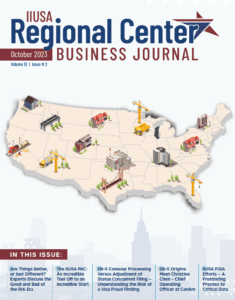
This is a member perspective and the views of the author are their own and do not necessarily reflect the views or position of IIUSA.
By Ronald R. Fieldstone, Esq. Partner, Saul Ewing and Rohit Kapuria, Esq. Partner, Saul Ewing
READ IN PDF
On or around September 2, 2022, USCIS published on the Federal eRulemaking Portal website (“Federal Register”), a draft version of the Form I-956K Registration for Direct and Third-Party Promoters (“Form I-956K”). As is standard with such rulemaking process, the public and stakeholders were allotted 60 days to provide comments.
Subsequently, on or around December 26, 2022 (a day after Christmas), USCIS published, on the Federal Register, a revised draft of the Form I-956K and extended the comment period by another 30 days. Interestingly, the revised draft Form I-956K was stamped with a December 14, 2022 date though posted twelve days later. More interestingly, however, is that on or around January 4, 2023, USCIS published the Form I-956K on its website and circulated a copy to all stakeholders who subscribe to the agency’s updates. This, of course, has created a little bit of confusion.
Is the Form I-956K now effective or will it be effective on or around January 26, 2023 (keeping in mind that it is not likely that the form will be further revised)? It would appear that since it has been posted on the USCIS website, without a draft notation, the Form I-956K is effective as of January 4, 2023. Therefore, Direct or Third-Party Promoters (herein collectively referred to as “Agents” or individually, each an “Agent”) should file the Form I-956K now though those who wish to wait until after the comment period ends on January 26, 2023 or at such time they have entered into a contract with a NCE (as defined below) would have strong arguments as to why this delay would be appropriate. This notwithstanding, there are a few other questions that remain unanswered/have not properly been answered by USCIS.
Based on the above, we have the following comments and concerns related thereto:
- Direct and Third-Party promoters who are actively involved in raising capital on behalf of New Commercial Enterprises (“NCEs”) should carefully review the Form I-956K and its associated instructions. It is also important that each NCE ensure that its underlying agent/brokerage agreements account for the requirement to file the Form I-956K. Bottom line, moving forward, no NCE should make a payment to any Agent that has not filed a Form I-956K related to that specific NCE’s project. Keep in mind that it appears that Agents would need to either amend previously filed Form I-956Ks or perhaps, file new Form I-956Ks as such Agents enter into agreements with new individual NCEs. Of course, if an Agent presently has agreements with more than one NCE, it can file a single Form I-956K and reflect these agreements therein. The issue whether the need will arise to file new or amended Form I-956Ks in the future depends on whether the agents enter into single multi-NCE agreements with the NCE’s primary parent entity or whether the affiliated NCEs all have separate ownership structures that would cause for multiple Form I-956Ks over the years.
- The question of who/what a Third-Party Promoter still remains somewhat unclear. Does it include sub-agents, for example, who are retained by a master agent that has entered into an agreement with a NCE? The fact that a “brokerage fee” is paid directly to the master agent and might trickle down to a sub-agent subsequently, appears to require that such sub-agent actually file the I-956K. USCIS, in a response to one of the comments posted on the Federal Register, notes that “[a]ny promoter …. engaged as a promoter on behalf of another promoter (including an entity) must submit Form I-956K.” If the NCE enters into a written agreement with the master agent and an unaffiliated person/entity, i.e., the sub-agent, introduces a prospective investor to the master agent, the master agent will derive the primary economic benefit of such investor subscribing for an interest in the NCE, and provide the sub-agent with a portion of such compensation. Based on USCIS’s interpretation, it would appear that even in the case where there is no written sub-agent agreement or where there is a vague email communication stipulating to some type of compensation structure for such introductions, the sub-agent would also need to file a Form I-956K. USCIS’s stated intent to require such sub-agents to file the Form I-956K will be difficult for the NCE to police outside of ensuring its master agent agreements have strong reps and warranties sprinkled throughout such documents. One imagines that this requirement would also create a chilling effect on the industry as a whole. Outside of the marketing consequences, however, the NCEs should be mindful of the issue of penalties described below.
- It is also noteworthy that as part of the requirements of the EB-5 Reform and Integrity Act (the “RIA”), the NCE is required to disclose all compensation paid to such third-party entities/individuals in relation to each individual’s subscription to the NCE. As a counter check to that, the Form I-956K serves to provide USCIS with biographical and related information on such “brokerage fees”. One of USCIS’s responses to the comments raised by stakeholders was that the Form I-956K should contain copies of the agreements with the NCEs (as alluded to above). As such, it appears that the agency may analyze these agreements from a compliance standpoint and/or use information provided to undertake a background check or such other analysis as not fully communicated to the stakeholders. Of course, one shudders to think whether the agency will also attempt to police SEC related issues when reviewing such agreements even though the agency neither has the jurisdiction nor competence to do so.
- Next, which persons, from the Direct and Third-Party Promoters must file the I-956K? Certainly, key executives would need to file it. However, USCIS, in one of its responses to the comments, also noted that the list of applicable persons “includes employees of entities with agreements in place to promote a regional center, any new commercial enterprise, an affiliated job-creating entity, or an issuer of securities intended to be offered to alien investors.” It further clarified that such employees would include “any promoter employed to work as a promoter”. This definition still remains unclear. Yes, we imagine that junior level employees, assistants such as receptionists or mailroom clerks would not count, and that the form would only apply to the executive employees of the applicable Agent as well as those employees that directly solicit investors. However, what exact positional levels/CVs would USCIS presume to deem an employee eligible for the filing of such Form I-956K?
- Last, penalties and wow are those intense. When one worries about chilling effect, the agency’s stated intent to impose penalties associated with the mismanagement or misrepresentation thereof or the failure to file or even properly file the Form I-956K is beyond comprehension. The Form I-956K’s instructions provides a stern warning indicating that if a Direct or Third-Party Promoter “knowingly and willfully [falsifies] or conceal[s] a material fact or submit[s] a false document with [its] Form I-956K, [USCIS] may take appropriate action on any associated applications or petitions, which may include the denial of any other immigration benefit.” Read this to mean, if the agency determines that a Direct or Third-Party promoter made a false representation or concealed a material fact, the investors associated with that particular NCE could be subject to petition denials. The implications to the NCE or job creating affiliated entities that have provided Form I-526E Petition denial guaranties or similar prepayment commitments in the event of such denial are potentially disastrous. It should also be noted that the RIA did not intend for such overreach and the industry should strongly contest this issue with USCIS.
In light of the non-exhaustive list of concerns outlined above, we would recommend that regional centers, NCEs and related industry stakeholders submit detailed concerns to USCIS over the course of the next few weeks and push back on some of the agency’s burdensome and unwarranted interpretations of the RIA’s requirements vis-à-vis the Form I-956K.








